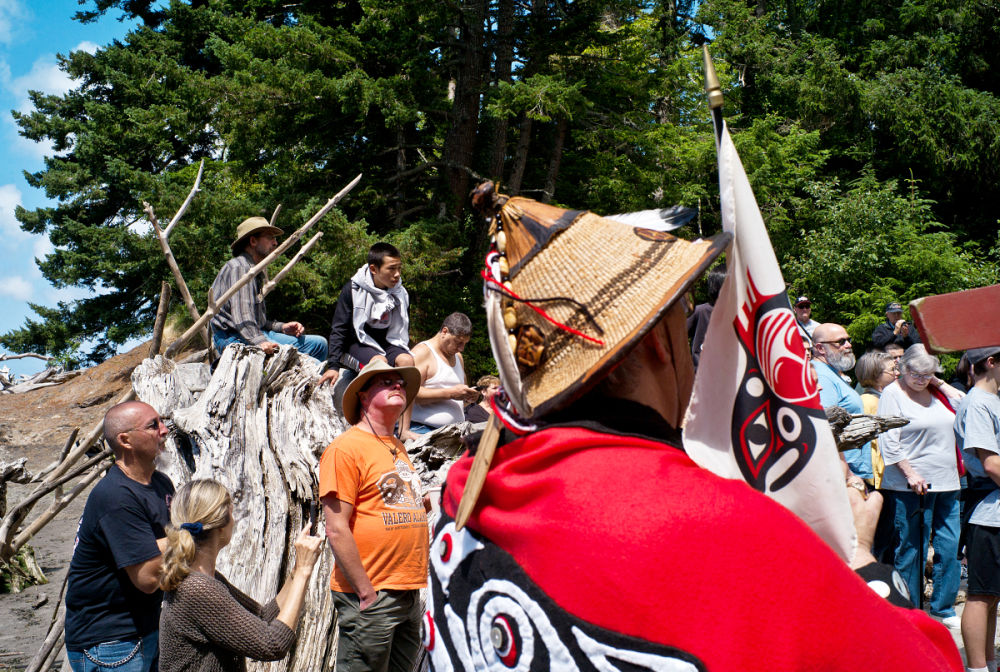
A crowd of tribal members and spectators take to the beach below Fort Columbia to honor the arrival of a canoe that carries the first salmon during Friday’s ceremony.
June 24, 2014 Chinook Observer
By Katie Wilson kwilson@chinookobserver.com | 0 comments
The Chinook Indian Tribe is fighting once again for federal recognition after the U.S. Bureau of Indian Affairs proposed changes to rules governing the process in May.
Under the revisions, currently unrecognized tribes, like the Chinook and dozens of others across the nation, would only need to prove continued existence back to 1934. Before, they had to provide documentation back into the 1800s.
Following the First Salmon Ceremony and Annual Meeting in Chinook last week, the Chinook Tribal Council began to plan. The first public meeting on the proposed rule changes will be held in Louisiana on Tuesday, July 1. The next public meeting will occur July 15 in Portland. (For details, see tinyurl.com/oq253k2)
“We’re trying to figure out who the folks are that we’d like to invite,” said Sam Robinson, acting chairman of the Chinook Tribal Council. Longtime Chairman Ray Gardner has stepped down from an active role on the council due to poor health.
Former Congressman Brian Baird has long been an advocate for Chinook recognition and told the council recently that he will continue to fight for them.
“It could be a full house,” Robinson said.
Recognition
The overarching Chinook Nation traditionally includes five tribes: the Lower Chinook, Cathlamet, Clatsop, Willapa and Wahkaikum tribes. However, the Clatsops on the south side of the Columbia now have a separate tribal organization in partnership with the Nehalem Tribe of northern Tillamook County. The Clatsop-Nehalem are pursuing federal recognition on a track independent of that of the Chinook Tribe in Pacific County.
Since explorers and sailors first encountered the Pacific Northwest, they have written about the Chinook people and the Chinook show up in nearly every history book about the region. Federal recognition, however, has been more elusive. They made a treaty with the U.S. at Tansy Point, Ore., in 1851 but Congress didn’t ratify the treaty.
Today, the Chinook have no reservation lands and no federal benefits though many were allowed to enroll in the tribe of their historical enemies, the federally recognized Quinault Indian Nation.
But they want to be known as the Chinook people and have pushed for this recognition for the last 40 years.
The Chinook were briefly recognized as a tribe in the closing days of the Clinton administration in January 2001, but in 2002 this was rescinded by the Bush administration, which cited irregularities in the process.
New rules
The Chinook blame politics.
The recognition process is long and complicated, often taking decades — several reasons for the proposed revisions to the rule now, according to the Bureau of Indian Affairs.
“The current process has been criticized as ‘broken’ or in need of reform,” the bureau wrote in the document outlining the changes. “Specifically, the process has been criticized as too slow… expensive, burdensome, inefficient, intrusive, less than transparent and unpredictable.”
Over the years, recognized tribes have also challenged the proofs put forward by unrecognized tribes.
In 1997, the Quinault Indian Nation filed a lawsuit in Tacoma’s U.S. District Court against the Chinook and Cowlitz tribes, which were both seeking recognition at the time. The Quinault asked the judge to halt the proceedings until they could examine the documents and records federal agencies were using to determine tribal status. They argued that the process unfairly favored the two tribes.
Though the lawsuit was eventually shot down and the Cowlitz maintained the federal recognition granted in 2000, litigation further slowed the process for the Chinook. Robinson and others on the Chinook Tribal Council worry it could happen again.
The Chinook aren’t interested in opening a casino, he said. It is unlikely they would get much by way of fishing rights.
“We need to be able to take care of ourselves,” he said. “Take care of our elders. The youth in our community.”
“You want to be on equal playing grounds with other tribes,” he added.
“We don’t have the services that everybody else has,” said Tony Johnson, chair of the Chinook culture committee and newly elected to the tribal council, at the tribe’s First Salmon Ceremony June 20.
Meanwhile, he said, the tribe has inherited other things common to recognized tribes: displacement, loss of tradition, drug and other substance abuse issues.
“We’ve managed to stay here,” said Peggy Disney, tribal secretary, standing in the middle of a circle of tribal members June 20, salmon smoking on cedar racks behind her. “But we have paid a large price to do so.”
First Salmon
There is one thing the Chinook have gained by continuing to go unrecognized: With no official programs in place to commemorate or build on Chinook traditions, the tribal members have had to cling to their history, passing it on carefully to their children.
“We had to hang onto it,” Robinson said. “We don’t have to squabble over money, that’s for sure.”
Over the years, he and Johnson have seen a growing interest among young Chinook to know their history and traditions.
It gives them hope that no matter how long this next fight for recognition might last, the generation behind them is ready for the challenge.
At a First Salmon Ceremony June 20, an important annual ritual for many Columbia River tribes, the atmosphere was like a family reunion. Parents, grandparents, children and guests of the Chinook Tribe welcomed a canoe paddled by tribal members. They shared cooked pieces of the first salmon and drank from Dixie cups filled with water drawn from a spring flowing on their traditional lands. They raised their hands to each other and gathered in a circle to drum and sing.
